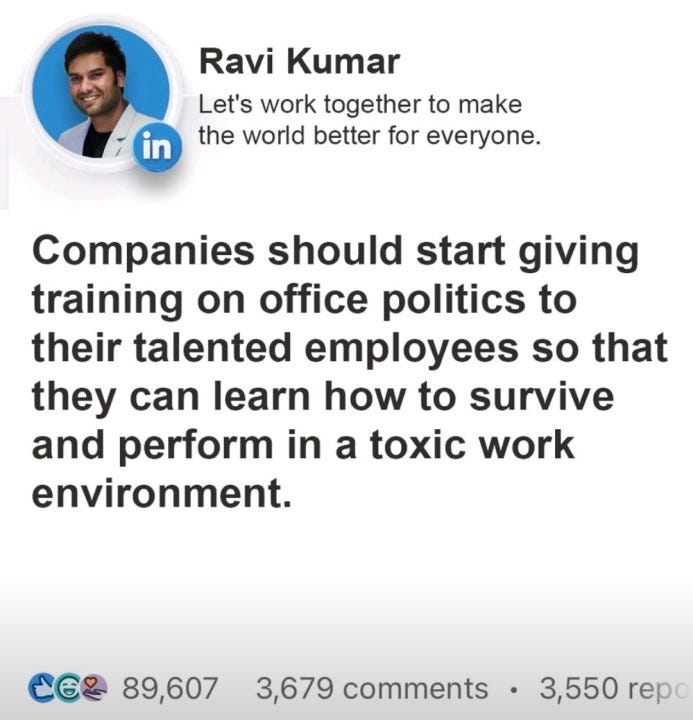HRs Role in Confronting and Navigating Toxic Culture and Leadership
Navigating Toxic Culture and leadership is a harrowing role for HR, but it can be especially traumatic when leadership isn't just toxic but psychologically and emotionally abusive.
Let's talk about the pervasive issue of toxic culture and its impact on organizations and shed light on HR's vital role in combating toxic leadership and fostering a healthy work environment.
A toxic culture can have devastating consequences on employee well-being and organizational success. It undermines trust, stifles innovation and engagement, and erodes morale, ultimately hindering productivity and growth.
With their immense power and influence, leaders hold the key to transforming organizational culture. However, toxic behaviors exhibited by some leaders can perpetuate a cycle of negativity, dysfunction, and dishonesty.
This is where QUALITY HR professionals should step in as the champions of change. Armed with their expertise and understanding of organizational dynamics, HR uniquely can shape and mold culture from within. By collaborating closely with leadership, HR can design and implement strategies to identify, address, and rectify toxic behaviors.
First and foremost, HR must foster a culture of transparency, accountability, and psychological safety, empowering employees to report concerns without fear of retaliation. Establishing robust feedback mechanisms and confidential channels for reporting incidents are crucial steps in dismantling toxic environments.
Moreover, HR can spearhead initiatives for leadership development and emotional intelligence training. By equipping leaders with the necessary tools to cultivate empathy, foster healthy communication, and manage conflict, HR can pave the way for a positive and inclusive work environment.
Additionally, HR should actively promote diversity and inclusion efforts, recognizing the value of different perspectives and experiences. By cultivating a workforce that is representative of a rich tapestry of backgrounds, ideas, and talents, HR can help counteract toxic behaviors rooted in biases and prejudice.
This is not a battle that HR can fight alone. I know an amazing HR pro; let's just call her "FD." I also know her boss, the COO, and I've seen and heard him cuss her and other female and male executives like dogs. FD spends most of her time cleaning up the toxic culture he fosters. The rest of her time is spent managing the fallout from that toxic culture. Designing PIPs and helping devise plans to avoid labor lawsuits and claims. The COO insulated himself from people who support the same initiatives. It's all too common. This COO manipulates situations and other mid-level and frontline managers to further his toxic mentality and agenda. In one case, I witnessed him manipulate a mid-level manager to say data was accessed from a specific device at a manager's home when, in actuality, I knew it wasn't, and the employee could prove it wasn't, but at the end of the day, the COO wanted this person gone. So he got the IT guy to say what he wanted him to say. The question is often, why can't or won't FD do something? Why doesn't the board do something? After all, this private equity board invested in this company to see acquisitions and growth, and there has been none. If anything, it has regressed. For the board, it would be a professional disaster to change leadership in a funded business that should've already matured and been sold. For FD, Some of it is self-preservation, and I know he's undervalued and mentally and emotionally beat these employees so much that they don't see their own value and the ability to be so much more elsewhere.
Then there's the Genovese Syndrome. Kitty Genovese was stabbed to death outside her apartment in Queens, NY. The murder would become the subject of debate. Primarily because some 3-dozen local residents were within earshot of the tragedy and did nothing.
One relevant point remains, and in many ways, it represents the same challenge FD, HR pros, and all of us face when we see abuse of power or the subjugation of others.
The Genovese Syndrome speaks to the silence of those who could make a difference but opt to do nothing at all.
Toxic leaders grow only when bystanders make that same decision.
Collaboration and cooperation across departments are paramount to effect lasting change. HR should partner with senior leaders, managers, and employees at all levels to create a united front against toxic culture and leadership. HR and toxic culture have a lasting effect on compliance and exposure as well.
HR can create workplaces that empower, inspire, and bring out the best in people.
hashtag#LeadershipMatters hashtag#CultureTransformation hashtag#humanresources


